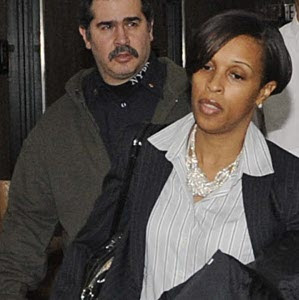Quathisha Epps. A person of humanity & compassion. The kind of American that a president normally honors at the beginning of his state of the union address.

Quathisha Epps is a 37 year old mother of 3. But over the last few weeks, I have not been able to forget her, and will probably remember her actions for the rest of my life.
Officer Epps did something very few people do.
A teenager was dying, and Officer Epps made sure he would not die alone. When that moment came, that all of us fear, somebody was there with him. He did not have to die alone.
It was two summers ago, when Officer Epps heard gunfire outside her Eldridge Street apartment in Manhattan.
Most of us would ignore the gunfire, but Officer Epps placed the baby she was nursing in his crib. She led her terrified older children, a daughter, then 15, and a son, then 10, into the bathtub.
Then, she ran downstairs — barefoot and in her nightgown, carrying towels — so she could give a last moment's comfort to a 17-year-old boy who would bleed to death in her arms.
"Baby, who did this to you," she asked. Vincent Cruz, 17, had been shot clean through the neck.
Even as she pressed her towels — new towels, she remembered — to the wounds, she realized there would be no answer.
"He's bleeding. He's gurgling. I told him, 'I'm here with you. You're not by yourself. You're very loved. Just hold on for me."
As she held young Vincent Cruz, Epps called 911. She also realized there was a large knife lying on the pavement behind her. Still holding the boy, she stretched her foot out behind her, so she could hold her toe against the knife, and keep anyone in the gathering crowd from picking it up.
Epps, a community affairs officer at PSA 5 in East Harlem, was there for another New Yorker:
"See, baby? They're coming for you," she told the boy as the sirens blared louder. Then she started something of a chant, hoping it could still reach him.
"I love you. I love you. I love you I love you," she repeated to the young stranger.
She didn’t know who he was. All she know was he was somebody’s child, another mother’s baby:
"I'm talking to a victim,"
"I don't know a name, just someone lying in the street, dying."
A day later, someone from the neighborhood would tell her who the boy was, and she realized that she knew him He lived nearby. Seven years prior, when Cruz was ten, and her own boy was three and in a pre-school program, Cruz had helped tutor her child.
"Somebody else's child was dying in the street," she explained of her actions, plainly,
"I just hope that, if the last thing he heard was that he was not by himself, and somebody genuinely loved him — if that's all he heard before he closed eyes — I'm happy," she said.
"This," she added, "is a case that never leaves me."
Officer Epps was there for another human being. She didn’t just call 911. She refused to let that baby die by himself. She told him that he was loved.
This entire situation reminds me of the fact that yes there are problems that government will not be able to solve. Yes, babies are having babies. But in NYC alone, thousands of teachers that serve as role models to many of our children are about to be laid off. It’s really sad considering taxpayers pay about $72,000 per inmate per year at Rikers, just about twice as much as tuition at the best private schools in Manhattan.
No matter where I am, I for one will always be thankful for Officer Quathisha Epps.
